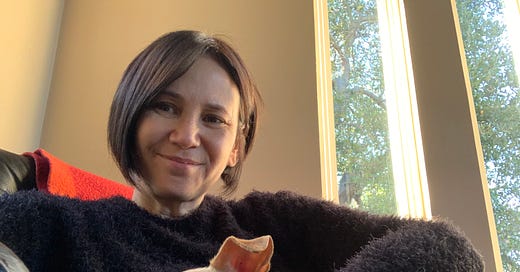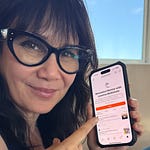Thrive? After job loss? I never thought thriving was possible after I was fired. And then again when I was laid off, I was at a complete loss. I’m not even sure I knew what thriving meant or if I ever thrived while grinding my way from promotion to promotion and gig after gig.
If I’m honest, and I truly endeavor to be (but sometimes I lie to myself!) I felt the sensation of thriving when I got a title bump, or someone praised my work, or I got a cool perk. Thriving was elusive and came from external wins vs. an internal sense of fulfillment and pride. Perhaps what I was experiencing was more of a sense of accomplishment vs. thriving.
So what does thriving mean?
Thriving (according to various sources) is:
🙌 Growing, developing, or being successful (Cambridge Dictionary)
🙌 Prospering or doing well; highly successful; growing or developing vigorously; flourishing (dictionary.com)
🙌 To progress toward or realize a goal despite or because of circumstances (Merriam-Webster Dictionary)
On one level, I was successful because I was flourishing as I moved up the ladder and took on more responsibility, made more money and leased a cute Audi TT. For all intents and purposes I was prospering.
Until it became more and more difficult to bounce back after professional setbacks. I lost connection with my resiliency because of the meaning I was creating around those setbacks. Here are a few examples:
I championed a pilot while I was at CBS about zombies. It was amazing (written by Paul Wernick & Rhett Rheese, the guys who went on to write the Deadpool franchise.) The pilot wasn’t picked up because the network was known for procedurals and it didn’t fit. I told myself that I had poor taste because I couldn’t get that one across the finish line. In retrospect, I had great taste as that pilot became Zombieland, one of my all-time favorite movies. BUT, I started to believe the “I have poor taste” narrative and began to lose confidence.
This loss of confidence (which was not the truth, but I treated it as such) led me to dial-up my people-pleasing. When I got the head of programming job at EPIX, the CEO pitched me an idea that I didn’t think was a match for our content mandate. But I said, “Yeah, let’s develop that idea” because I wanted to make him happy vs. do my job properly. When I was laid off from that gig a few years later (when the department was de-funded) I created another false narrative that I’m not cut out for corporate America.
I made a decision to pivot fully into producing, which aligned with my desire to be more present for my kids as they were growing up. However, the hard truth is that my ability to bounce back from loss had diminished.
I was no longer “thriving” in each consecutive role for the following reasons:
👿 I became more and more reliant on external validation vs. listening to my internal compass and intuition.
👿 I found myself listening to negative self-talk that I often refer to as "gremlin" voices. The gremlins seemed to find an opening that was created by the losses, and the more I listened to them, the meaner they got. At times, it felt like their words were the truth.
👿 I lost connection with resiliency. As humans, we have an innate ability to bounce back from adversity, but it's easy to forget that when we're struggling to make sense of a painful experience.
For many years after experiencing loss I felt like I was stumbling through darkness.
I worked with therapists and coaches, attended workshops, read countless books, and listened to podcasts in search of something that would give me a big “aha” moment. While all of these things are helpful in their own way, it wasn't until I discovered the term “disenfranchised grief" that everything really clicked for me.
Bereavement expert Kenneth Doka coined this term to describe any type of loss that isn’t openly acknowledged, publicly mourned, or socially validated. As I reflected on my own experiences with professional losses (like projects not being well-received or being fired/laid off), I realized that these losses fell into this category. Because they weren't seen as real losses I didn't feel like I had permission to mourn or grieve. As a result I created hurtful meaning around those losses, like “there’s something wrong with me” or “I don’t have what it takes.”
Discovering this concept of disenfranchised grief was a turning point. It helped me to see that my experiences were valid and deserving of mourning, even if they weren't widely recognized as such. It also allowed me to re-frame the meanings I had created around those losses and to start to heal.
Through my own experiences, I've learned just how crucial it is to mourn in order to thrive. By giving myself permission to grieve, I was able to reconnect with my internal compass, including my values and purpose, as well as my intuition and resiliency. It was only once I allowed myself to truly mourn that I was able to course correct and start to thrive again.
I've come to realize that grief and loss are a natural part of the human experience, and that we can't always control when or how they happen. But we can control how we respond to them. By allowing ourselves to mourn, we create space for healing and growth. And through that healing and growth, we can find new opportunities for thriving, even in the face of loss.
If any of this resonates with you, I'd love to offer my support. There are a few ways we can work together:
🧑🤝🧑 First, you can subscribe to my weekly blog and blogcast where I share stories and insights on Grief and achieving your goals. I strongly believe that these two are interconnected, and until we develop the understanding and skill to deal with grief, it can hold us back from achieving our dreams.
🧑🤝🧑 In addition you can join the Moonshot Mentor Community where I lead grief groups, masterminds, and accountability teams. These groups are a great way to connect with others who are going through similar experiences.
🧑🤝🧑 For those who are looking for more personalized support, I offer private coaching sessions via zoom and VIP days for individuals. These sessions are tailored to your specific needs and goals, and can be a great way to dive deeper into your grief and start to build the skills and resilience needed to thrive.
I’m also co-hosting a three-day retreat called Thriving After Job Loss: A Journey of Self-Discovery, Resilience and Renewal to support people who have been fired, laid off, down-sized, or quietly (or loudly!) quit.
It will take place May 26-28 in Downtown Los Angeles 🌴, and is designed to help people bounce back from job loss with renewed strength and confidence – whether it’s a recent experience or from the past. To ensure that everyone gets the most out of the experience, we’ve limited the retreat to just 12 participants, allowing for an intimate and supportive atmosphere conducive to deep personal growth.
The main objective is to provide people with the tools and support they need to move forward, which includes:
Recognizing and addressing sources of grief, especially around career setbacks
Learning effective tools and rituals to properly mourn and cope
Overcoming self-doubt and negative self-talk
Discovering new perspectives and meaning in the face of professional loss
Empowering yourself by identifying your North Stars - your values and purpose - to reclaim agency and create a brighter future.
My co-host is an amazing woman, Katy Chen Mazzara 😄, who is a trauma-informed financial wellness coach who teaches folx how to shift from survival mode into expansion mode, so they attract the “right” opportunities. Katy will be leading participants through a powerful somatic method to release trauma, anger, or sadness. To top it off, we’ll also be offering a soothing sound bath to help reset the nervous system and promote deep relaxation. 🦋
In addition to the transformative work we’ll be doing, we’ll also be providing snacks and meals 🥙, ample time for reflection 🤔, and opportunities to connect and build community 🧑🤝🧑.
We’re committed to ensuring that you have the tools and guidance you need to make meaningful progress on your journey to thriving after job loss. To that end, our support will continue post retreat. Katy and I are big believers in after-care and will be offering fantastic bonuses, including one-on-one sessions, to help you stay on track and build momentum after the retreat. Our goal is to support you every step of the way as you create a bright and fulfilling future. 😃
The retreat is currently available at the early-bird rate of $997 (until May 5), and will be $1397 at full price. If you or someone you know is interested, here’s a link for more information and to sign up. And if you have any questions or concerns, don’t hesitate to reach out to me. I’d be happy to schedule a zoom or call to discuss the retreat in greater detail.
Bottom line in all of this: It’s absolutely possible to thrive after job loss when you have the community and tools to do so.

I love to support ambitious, driven people who are feeling stuck and want to regain momentum so they can hit their next big goal. Want to explore working together? Check out my website.
If you’re resonating with what you’re reading, please consider subscribing. What’s that mean?
🙌🏾 You’ll receive regular emails (with lots of heart and a bit of humor) that share a tool or insight from my coaching practice.
🙌🏾 Typically the blog and podcast will have a question at the end to provoke thought that supports you in your growth.
🙌🏾 Updates on offerings, free stuff, recommendations, referrals.
















Share this post